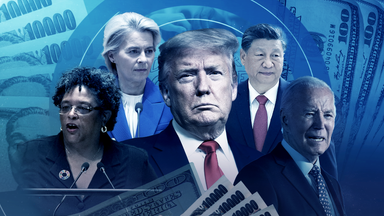COP29: The almighty row over climate cash that’s about to boil over
Donald Trump’s victory will make troubled negotiations even rockier, and cooperation between the EU and China more important.

China says it’s a developing country, so it doesn’t have to pay into a major new fund to help poor countries cope with climate change. The United States disagrees.
This is at the heart of an almighty row about to boil over at the UN COP29 climate talks next week in Azerbaijan.
Or is it all just an elaborate “distraction”?
Driving this brewing storm is something called “climate finance”.
It’s been whipped up further by the re-election of Donald Trump, a climate denier expected to withdraw the world’s largest historic greenhouse gas emitter from global efforts to tackle climate change.
Why do countries pay for overseas climate aid?
Back in 2009, 23 developed countries – including the UK, US and Japan, and the EU – agreed to pay $100bn (£75.5bn) a year by 2020 to developing nations, to help them ditch fossil fuels and adapt to a harsher, hotter climate.
The new fund was a victory for poorer countries, even though the sum is just a drop in the ocean of the trillions they now need.
It acknowledged that high-income countries have done far more to cause climate change, with their larger economies and more polluting lifestyles. While poorer nations are disproportionately battered by the impacts, like the flooding that swamped Pakistan in 2022, or drought that has eaten away at Malawi’s crops.
Meanwhile they are pressured to forego their own fossil fuel-powered development and go straight for clean energy, which is much harder for them to finance.
“The stakes couldn’t be higher,” said Malawian negotiator, Evans Njewa, representing a group of 47 least-developed countries.
“We can’t keep paying the price for a crisis we didn’t cause.”
But 2020 came and went, and the donors missed the target of $100bn a year – finally hitting it in 2022.
That fund expires after 2025, and plans for a new, bigger one will be fought over for two weeks in Baku, Azerbaijan’s capital.
The US, UK, EU and other leaders had planned to push for five to 10 more wealthy developing economies to start chipping into the piggy bank.
But developing countries suspect foul play.
The list of countries that just won’t die
When the first fund was agreed, the list of donor countries was based on an old Organisation for Economic Co-operation and Development (OECD) list from 1992.
Back then, countries like China, Saudi Arabia, Qatar, UAE and Korea were regarded as developing countries.
And a lot has changed since then.
China, for example, is now the world’s largest polluter, second-largest economy and has been to the moon.
The ‘distraction’
But here’s the thing.
China already voluntarily pays an average of $4.5bn of climate finance a year, according to analysis by the World Resources Institute (WRI), though not on very friendly terms.
Korea also voluntarily pays. So does Saudi Arabia. The list goes on.
And China’s emissions per person are on average 8 tonnes per year, but the average American’s is almost double at 14.9 tonnes.
That’s partly why the US gets accused of failing to pay its “fair share” of climate finance – a measure devised by thinktanks like US-based WRI to assess what proportion of climate finance developed countries should pay, based on their wealth and their responsibility for climate change.
In 2023 the US paid $9.5bn – it was much less under President Trump during his last term.
A spokesperson for the Chinese embassy to the UK said: “Providing financial support to developing countries is an unshirkable moral responsibility of developed countries and, more importantly, an obligation they must fulfil under international law, including the UNFCCC (United Nations Framework Convention on Climate Change) and the Paris Agreement.”
They added: “Developed countries promised to provide US$100 billion per year for climate action in developing countries in 2009, but for too long they have only paid lip service, and now they owe developing countries over US$300bn in total.” Sky News could not independently verify the $300bn figure.
Li Shuo, director of the China Climate Hub at the Asia Society Policy Institute in Washington DC, said: “The Chinese authority sees this ‘new contributor’ conversation as a distraction, as a way for the US to hide behind its climate finance deficit.”
Other vulnerable nations also fear rich countries are trying to “dilute” their contributions, and more wallets will not equal more money in the pot.
The US-China ‘fistfight’
In no uncertain terms, the US rejected any concept of a “fair share”.
A senior US official, speaking before the election, said: “The $100bn is a collective goal. It doesn’t specify any particular allocations… there is no ‘fair share’ concept embedded in it.”
Shuo said the political context is very different from when previous funds were agreed. “We’re dealing with a geopolitical fist fight between the two biggest economies and emitters in the world, the US and China.
The bilateral tension generates a “desire from each side to finger point”, he said.
What impact will the US election have?
“There’s also a very strong reason to believe that this US climate finance deficit will persist,” Shuo said.
Trump, who calls climate change a “scam”, is expected to wrench the US out of the landmark Paris Agreement again, stopping much US money from flowing abroad, but also diminishing its influence.
Read more:
2024 on track to be first year to exceed 1.5C warming threshold
Deadliest weather events were fuelled by climate change
The talks in Baku will continue regardless, and the US team will still be taking their cues from Biden, but their case will be met with scepticism and mistrust.
“Pushing for more ambitious climate finance is going to be almost impossible without the US buy-in, which will demotivate developing countries from taking seriously the climate ambitions of the West,” said Elisabetta Cornago, a
senior research fellow at the Centre for European Reform.
EU leaders will have to work even harder to convince new countries like China and some Gulf states to pay in – but if successful would find it slightly easier to sell the new fund back at home, where finances are squeezed and some countries have shifted to the right.
How big is big?
Developing countries will soon need at least $1.3bn a year to cope with climate change, according to various analyses.
But given domestic politics, and a likely soon absent US, the goal in that region is unlikely.
That’s why donor countries want the next fund – known in UN jargon as the new collective quantified goal (NCQG) on climate finance – to have multiple layers.
Firstly, a replacement for the previous $100bn, with more countries paying in public money.
This would be followed by one or two further tiers including private sector cash and other levers governments could pull to channel in more money, like de-risking lending, or levies on polluting industries like fossil fuels, shipping and aviation.
But Michai Robertson, lead finance negotiator for a bloc of 39 island states including Fiji and Antigua and Barbuda (AOSIS), said that it would be almost impossible to ensure the extra income streams flow.
“It’s just crazy,” he said.
Countries are obliged under the Paris Agreement to agree to a new fund, and everyone at least agrees it should be bigger.
But with deep divisions over almost every aspect – from the donors to the timelines to the actual sums involved – negotiators in Baku have a mountain to climb.



